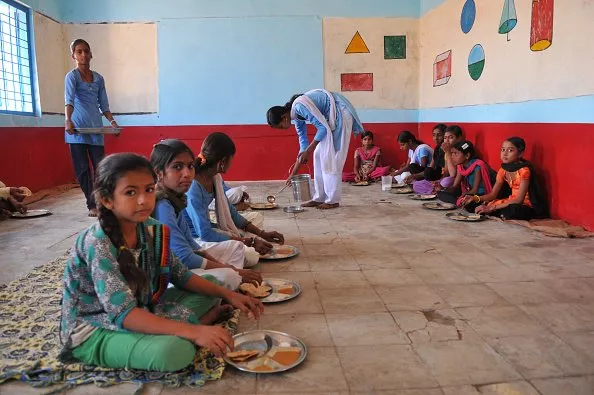

Substituting eggs for equally nutritious alternatives will protect children’s health, animals and the environment

Animal Equality explains how substituting eggs from the Mid Day Meal Scheme will help combat the environmental damage and animal suffering their production causes
In order to save the environment, animals and protect our health, programs like ‘Meatless Mondays’ and ‘Conscious eating Brazil’ are emerging in many countries where schools are slowly ditching animal products for a healthier plant-based diet. Closer to home the German International School in Chennai made news in 2017, when it announced it would serve only plant-based foods. The United Nations Food and Agriculture Organization also advocate the urgent adoption of more plant-based diets at a global level to combat climate change.
Negative effects of eggs on human health:
Eggs have 0 dietary fibre, are high in cholesterol and saturated fat. Egg consumption has been associated with colorectal cancer, prostate cancer, bladder cancer and diabetes. People who consumed a lot of eggs increased their risk for cardiovascular disease by 19%, and those with diabetes by 83%.
Food contamination is one of the severe threats to food safety in India. Pathogens like E. Coli and Salmonella easily find their way to the food chain through poultry. Salmonella is one of the leading causes of food poisoning. It commonly occurs in warm-blooded animals, therefore poultry farms are often breeding grounds of the pathogen. Eggs are also one of the most common carriers of salmonella.
The organization lists some of the other reasons why eggs should be susbtituted from MDMS:
Many schools do not serve eggs because they just don’t have the budget for it. In many states, it has become a huge burden for Mid Day Meal agencies to serve eggs. The cook-cum-helper have to procure the eggs themselves and get reimbursed only after 3 months. Eggs aren’t subsidised under the Public Distribution System. Some schools have even served rotten and small sized eggs. Students have fallen ill after consuming contaminated food including eggs in MDMS. Amid bird flu scare, bananas and pakodas had replaced eggs in the mid day meals in many schools.
Amruta Ubale, Executive Director of Animal Equality, says, “While there are discussions on serving eggs in Mid Day Meal Scheme they focus only on the political and religious perspective. We need to look at the real issue – the cruel and illegal ways in which eggs are produced and how it puts our environment and health at risk.”
Animal Equality conducted a nationwide investigation into egg farms which revealed how four to eight hens crammed in a cage no bigger than two A4 sheets of papers, which results in them often stepping on each other. They suffered from sore, cracked and deformed feet from the wire floor of the cages and abrasions and skin irritations due to the high concentration of ammonia from their litter. The litter was collected in huge piles underneath the stacked cages, only disposed of once every few weeks. This lack of timely disposal can lead to diseases and mortality among the birds. There was little to no veterinary care provided to the birds. They were given feed laced with antibiotics. These cruelties violate various sections of the Prevention of Cruelty to Animals Act, 1960.
Ubale adds, “We have seen workers and their children working for long hours at the farm and sometimes they live at the farm. Due to the harmful environment at egg farms, workers are known to contract respiratory diseases like asthma and chronic bronchitis.”
Negative effects of egg production on the environment
Animal agriculture has a vast environmental footprint. Feed production for egg-laying hens occupies most of the land. It takes 100 grams of feed like corn and soy and 200 litres of water to produce a single egg. These can be used instead for human consumption. Eggs produce a carbon footprint of 2.7 kg of CO2 per dozen eggs.
Ubale adds, “The government of India has already introduced a plan to reduce pollution by 35% in 3 years and 50% in 5 years in 100 cities. Mid Day Meal Scheme can play a crucial role in reducing climate change by substituting or reducing eggs from their scheme. It is about time we look at including options which are not just nutritious but also environmentally sustainable and animal friendly.”
Nutritionally sound replacement for eggs:
National Institute of Nutrition Dietary Guidelines states that, “A combination of cereals, millets, pulses, vegetables and fruits provides almost all nutrients including better quality proteins.” They specifically state, “Green leafy vegetables, other vegetables and fresh fruits are treasure trove of several minerals and vitamins and hence, protect from diseases.”
Even established nutrition and health institutes around the world promote a plant based diet. The Harvard School of Public health says “Eating a plant based diet is the healthiest.” The Academy of Nutrition and Dietetics which is the world’s largest organisation of food and nutrition professionals has said, “Appropriately planned vegetarian diets, including total vegetarian or vegan diets, are healthful, nutritionally adequate, and may provide health benefits in the prevention and treatment of certain diseases. Well-planned vegetarian diets are appropriate for individuals during all stages of the life cycle, including pregnancy, lactation, infancy, childhood, and adolescence, and for athletes.”
Animal Equality in consultation with nutritionist has developed a list of recipes which have the same nutritional capacity as eggs. Out of all they highly recommend moong dal ladoo. They say, “Not only are these moong dal ladoos nutritionally wholesome but work out cheaper than eggs.”
100gms moong dal provides 24gms protein and cost Rs.12, whereas 4 eggs (100gms) provides 24gms protein but costs Rs.16
